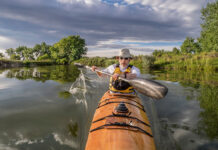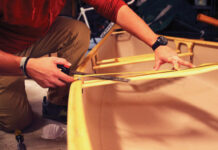Maybe your canoe has seen one too many portages and the yoke has finally given out. Or maybe your shoulders have seen one too many bruises and it’s time to try a different yoke design. Either way, installing a new yoke on your canoe is simple business.
First, of course, you’ll need to pick out a canoe yoke. There is ongoing debate whether contoured and carved-out or padded yokes are most comfortable—choose the style that works for you. Ash is strongest, poplar is lightest, and walnut or cherry offers a unique look.
Once you have your choice in hand, it’s time to learn how to install a canoe yoke.
Step 1: Remove the old yoke
If the old hardware is corroded, bent or stripped, replace it with stainless steel or brass #10-24 machine bolts, cup washers, flat washers and lock nuts.
Step 2: Size the new yoke
New yokes come longer than you will need. Simply lay the old yoke over the new one with the centre points aligned. If you don’t have the old yoke, you’ll need to measure the distance between the gunwales at the canoe’s midpoint.
Keep in mind that the yoke’s length can spread or narrow the canoe’s beam. Pulling the gunwales together makes the hull rounder and increases tumblehome while spreading the gunwales increases flair and flattens the boat’s bottom.
Step 3: Balance the canoe
Don’t just screw the new yoke into the old holes—now is your opportunity to ensure your canoe is perfectly balanced on the yoke. To do so, take a tape measure and find the middle of the canoe from end to end and mark it on both gunwales using a wax pencil.
Next, place the yoke across the canoe at your markings, under both gunwales and then rotate it so its narrow edge is facing upwards. With one person on either side of the canoe, lift up on the yoke. The canoe may tip to one direction. Adjust the yoke until the canoe is balanced and mark its position.
Step 4: Decide which way to face the yoke
By installing the yoke’s opening facing the bow, you can just flip the canoe onto your shoulders and go when you land at a portage.
Alternatively, if you have a stern thwart within arm’s reach of the yoke, you can install the yoke facing the stern, allowing you to hold onto the thwart while portaging.
Step 5: Drill the holes
With the yoke across the canoe at your markings, hold it flat under the gunwales, and then pull the gunwales together so there’s no space between the yoke and the hull. Next, drill holes through both the gunwale and the yoke. Drill in the middle of the gunwale for optimum strength and ease of hardware installation.
Step 6: Install the bolts
Install the bolts with the cup washer on top of the gunwale and the flat washer underneath and you’re ready to portage.
Johno Foster installed countless yokes as a canoe builder in a past life. He is now a northern river wilderness canoe guide and paddling instructor.









